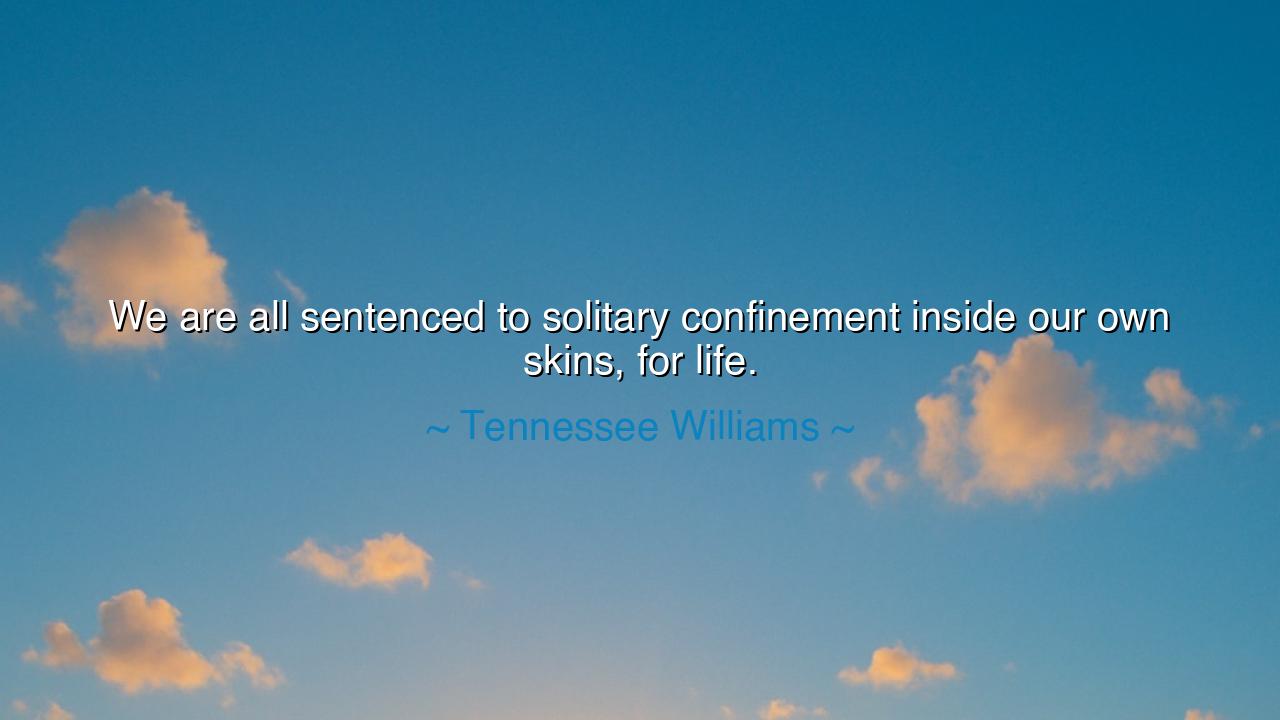
We are all sentenced to solitary confinement inside our own






“We are all sentenced to solitary confinement inside our own skins, for life.”
Thus spoke Tennessee Williams, the poet of human pain and passion — a man who gazed deeply into the heart of loneliness and found within it both tragedy and truth. His words, heavy as stone yet luminous with insight, remind us of a reality that no one escapes: that each of us is born within the walls of our own mind and body, and that no matter how closely we touch, love, or speak, we can never completely step outside ourselves. We live, we dream, we suffer, all behind the invisible barrier of our own skin — forever alone, and yet forever yearning to connect.
Williams, whose plays bled with the anguish of human isolation, understood this truth through his own life. He was a man of immense sensitivity, who found both glory and grief in human intimacy. He loved deeply, yet he knew that every soul, no matter how intertwined with another, remains a mystery sealed from total understanding. His sentence of solitary confinement is not one imposed by cruelty, but by the nature of existence itself. We are confined not by walls of stone, but by consciousness — each mind its own universe, unreachable except by the fragile bridges of empathy and art.
This understanding echoes the wisdom of the ancients. The philosopher Plato spoke of the soul’s separation from the divine, longing always for reunion with its source. The Stoics, too, taught that the human spirit must learn to dwell in its own citadel, self-sufficient even amidst the tumult of the world. What Williams expressed through poetry, the ancients declared through philosophy: that to be human is to live both in connection and in exile, joined to others by feeling but divided by individuality. No two hearts ever beat in perfect unison; there is always a distance — sacred, sorrowful, and inescapable.
And yet, within this confinement, there lies a strange freedom. For if we are each enclosed within our own being, then we are also entrusted with the sovereignty of that inner world. No tyrant, no storm, no betrayal can fully invade it. The soul remains its own keeper, its own kingdom. In solitude, one can discover depths that no company could ever reveal. The poet Emily Dickinson, who rarely left her home, knew this well. Though she lived in seclusion, her inner life was vast — a cosmos of thought and wonder. Her so-called prison became a temple, where she communed with eternity. So it can be for each of us, if we learn to make peace with the solitude of our skin.
But this truth also demands compassion. If every person lives in their own solitary confinement, then every act of love, every gesture of kindness, becomes a miracle — a bridge built between two isolated worlds. To reach out, to listen, to truly see another person, is to perform an act of quiet heroism. Williams’ words are not meant to breed despair, but understanding: that connection, though imperfect, is sacred precisely because it is so difficult. When we embrace another soul, we are not erasing the walls — we are touching them gently, acknowledging their presence, and saying, “I see you.”
Still, many fear solitude. They drown it in noise and distraction, unwilling to face the echo of their own thoughts. But the wise know that to live fully, one must first befriend the silence within. Our solitary confinement is not a curse to escape, but a condition to understand. It teaches self-knowledge, patience, and the art of inward listening. Those who learn to dwell peacefully within themselves can offer truer companionship to others, for they love not from need, but from wholeness.
The lesson of Williams’ words is clear: accept the solitude of being human, and let it refine you. Do not flee from the self, but enter it as one would enter a sacred chamber. There, within your own skin, you will find both the prison and the key. Learn to speak kindly to your own soul, to understand its rhythms and its fears. And when you step back into the world, you will see others not as strangers, but as fellow prisoners of the same divine solitude — each carrying a universe behind their eyes.
So, remember this: though we are all sentenced to solitary confinement inside our own skins, the sentence is not without grace. Within your solitude lies your identity; within your isolation, the chance for empathy. The world may never fully know you, but through courage, reflection, and compassion, you can know yourself — and in that knowing, you will discover that even in your confinement, you are never truly alone.






AAdministratorAdministrator
Welcome, honored guests. Please leave a comment, we will respond soon